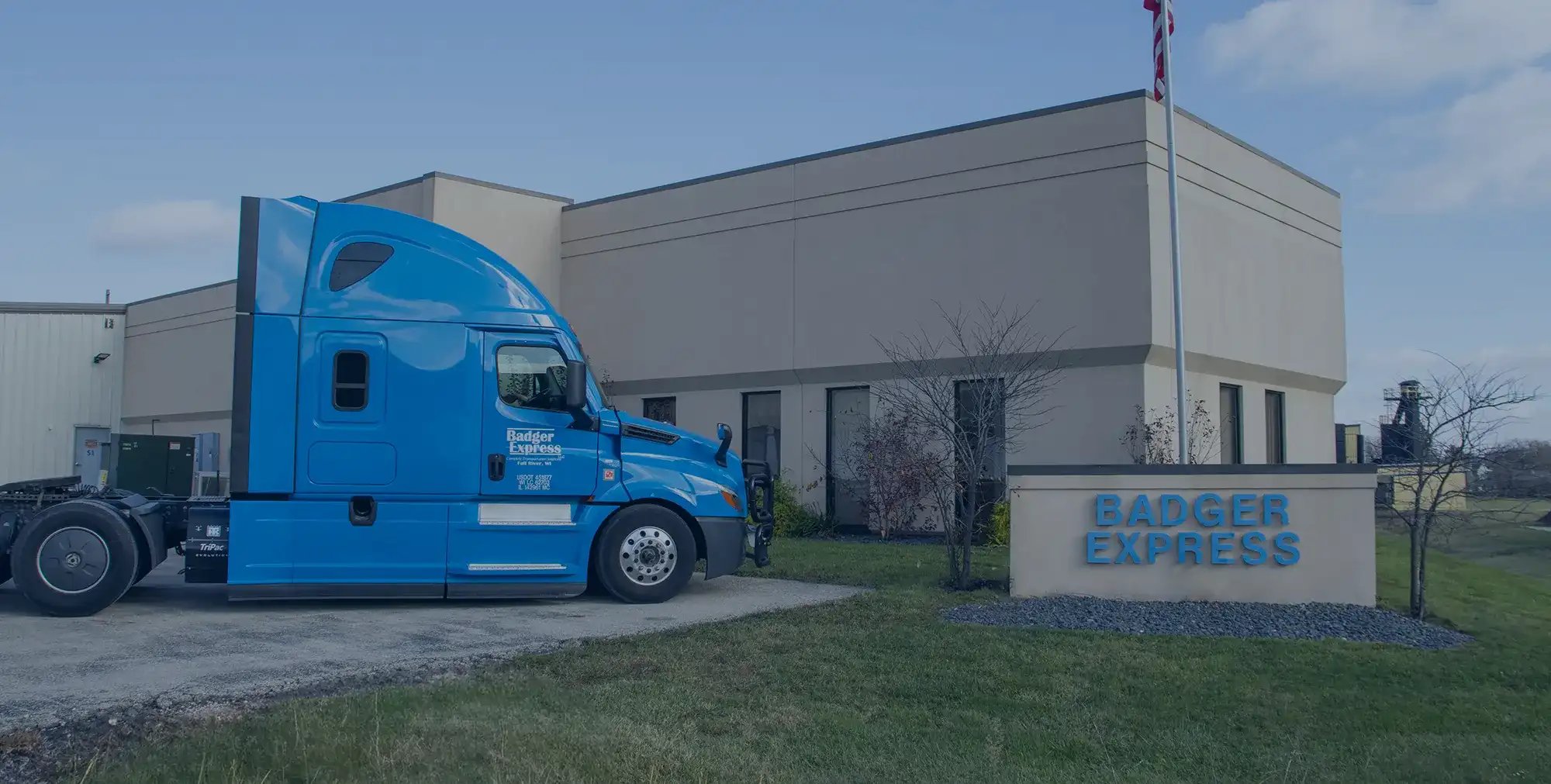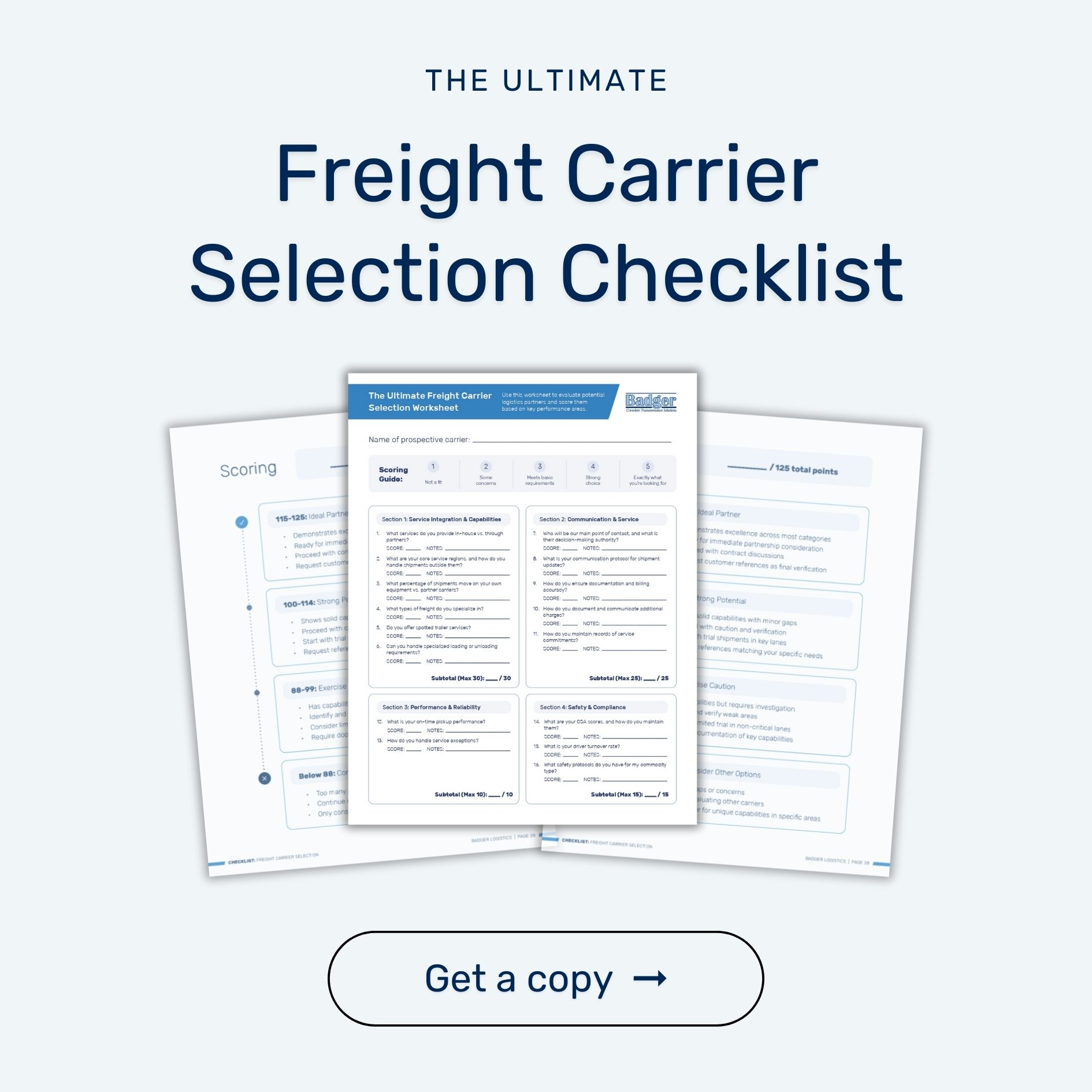Key takeaways
- Construction logistics faces unique seasonal challenges — material suppliers often stockpile inventory in winter months (December-February) to benefit from bulk pricing incentives.
- Different materials require specialized equipment: standard dry vans for most materials, refrigerated trailers for temperature-sensitive adhesives in winter, and specialized trailers (RGNs, flatbeds) for equipment and oversized materials.
- While price matters, the true value comes from carriers who thoroughly vet details, communicate proactively, and prevent costly mistakes for both you and your customers.
- A flexible approach mixing contracted rates with spot market options helps navigate seasonal fluctuations and ensures you have capacity when you need it most.
Badger Logistics provides integrated transportation solutions combining asset-based trucking, brokerage services, and warehousing to overcome Wisconsin's unique logistics challenges. Learn more about our Wisconsin shipping expertise or get a competitive rate quote to join 500+ shippers solving their freight challenges with one call.
A brief introduction
The construction industry presents a unique set of logistics challenges, particularly for material suppliers and contractors who rely on timely, well-coordinated deliveries to maintain project timelines.
After years of working closely with lumber companies, adhesive manufacturers, concrete suppliers, and equipment providers, I've gained valuable insights into how the right transportation approach can make a significant difference in operational efficiency and cost management.
The seasonal patterns in construction logistics
One of the most notable characteristics of construction logistics is its pronounced seasonality. For material suppliers, this often follows a predictable pattern:
|
Here's why shippers choose us for their food-grade freight:
|
Understanding these cycles is crucial for effective planning. Rather than being caught off guard by seasonal peaks, work with your logistics partners in advance to secure necessary capacity for your busy seasons.
Equipment versatility for different construction materials
The construction industry utilizes a remarkably diverse range of transportation equipment, each serving specific needs:
Dry van trailers
The workhorse for most construction materials that don't require special handling—ideal for packaged goods, certain lumber products, and materials that aren't affected by weather conditions.
Refrigerated (reefer) trailers
Surprisingly important during winter months for temperature-sensitive materials like adhesives and certain chemicals that must be protected from freezing. As one of our clients, Holcim, demonstrates, switching from dry vans to reefers during cold months is essential for maintaining product integrity.
Specialized equipment for heavy/oversized loads
- RGNs (Removable Gooseneck Trailers): Perfect for loading heavy equipment like bulldozers and excavators, as they can be lowered to ground level for direct driving access.
- Flatbeds and Step Decks: Ideal for lumber, steel beams, and other materials that require top or side loading.
- Conestogas: Offer protection from the elements while maintaining the loading flexibility of flatbeds.
Intermodal Options
For suppliers with predictable, high-volume shipping needs, rail transport can provide significant cost advantages. Many of our construction clients use intermodal for baseline shipping needs while relying on truck transportation for time-sensitive or overflow shipments.
Balancing cost and value in construction shipping
In an industry where margins matter, finding the right balance between transportation costs and service quality is crucial. While it might be tempting to always choose the lowest-priced option, my experience with construction clients has revealed some important considerations:
The hidden costs of cutting cornersThe cheapest rate often comes with less vetting, poorer communication, and higher risks of service failures. For time-sensitive project materials, these failures can cascade into expensive project delays. Consider this recent example: A client needed to ship a warranty replacement part to a job site by Monday for a Tuesday installation. The initial request seemed simple, but our team's due diligence revealed critical details that would have otherwise been missed:
Without addressing these requirements upfront, the shipment would have failed regardless of price, delaying the repair and damaging customer relationships. |
Contracted vs. spot rate strategiesFor construction logistics, I typically recommend a hybrid approach:
|
Best practices for optimizing construction logistics
Based on my experience working with construction industry clients, here are the practices that consistently yield the best results:
| 1. Plan for seasonal fluctuations. Develop a transportation strategy that accounts for your predictable seasonal patterns. At Badger Logistics, our flexible capacity model combines asset-based trucking with an extensive brokerage network, allowing us to scale resources to match seasonal needs. |
|
2. Communicate your equipment requirements clearly. Be specific about your needs regarding:
|
|
3. Consider the full supply chain impact. When evaluating transportation options, consider the broader impact on your operations:
|
| 4. Value long-term relationships. The best logistics partnerships aren't transactional—they're built on mutual understanding and shared goals. A logistics provider who takes the time to learn your business, understand your challenges, and anticipate your needs becomes an invaluable asset in managing the complexities of construction logistics. |
Final thoughts and next steps
The construction industry faces unique logistical challenges that require specialized solutions. Whether you're a material supplier stocking up for the busy season or a contractor coordinating deliveries to multiple job sites, the right logistics approach can make the difference between project success and costly delays.
At Badger Logistics, we've developed deep expertise in the construction industry's specific needs. Our combination of asset-based transportation, brokerage services, and customized solutions allows us to support construction clients through every seasonal fluctuation and specialized requirement.
Talk to us for a better logistics experience

At Badger Logistics, we combine asset-based trucking with extensive brokerage capabilities, warehousing, and maintenance services to provide integrated logistics solutions for Wisconsin shippers. This guide reflects not just my personal experience but the collective wisdom of our team, which brings over a century of combined Wisconsin logistics experience to every shipment we handle.
While freight transportation will always involve challenges, the right approach and partnerships can transform logistics from a constant struggle into a sustainable competitive advantage. I hope this guide helps you navigate Wisconsin's unique shipping environment more effectively.
For specific questions or to discuss your particular freight challenges or to get a competitive quote, feel free to reach out directly or submit the quote request form below. We'll be in touch within one business day.










